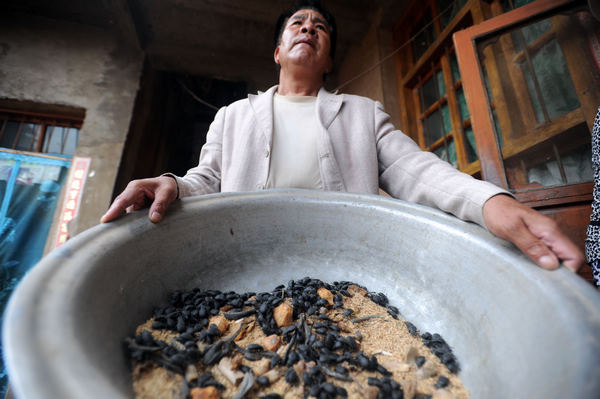Hot issues
Plant stored toxic waste, endangering residents
Updated: 2011-08-17 08:18
By Yan Jie (China Daily)
|
 |
|
Wang Jianyou, a resident of Xinglong village, shows on Sunday the bugs he eats every day. Wang, a lung cancer patient, believes eating 50 bugs a day will help to relieve the symptoms of his illness. He said six to seven residents in his village die from cancer every year, which he suspects to be the result of pollution from the company Yunnan Luliang Chemical Industry. [Ren Dong / China News Service] |
BEIJING - A chemical plant implicated in a major dumping investigation in Southwest China has admitted to storing huge amounts of toxic waste for decades, authorities said on Tuesday.
The owner of the plant, Yunnan Luliang Chemical Industry, has been ordered to halt operations and is now cleaning up the remaining 148,400 tons of chromium waste that piled up there since 1989.
The hills of waste, which were separated from the Nanpan River by just a small dirt path, will be removed and detoxified, according to a statement from officials in Qujing city, Yunnan province.
The river is in the upper reaches of the Pearl River, which flows through the Guangxi Zhuang autonomous region and Guangdong province. Local governments said they will monitor the river's water quality every day.
Investigations into the plant began after nearby villagers complained their livestock had died after drinking water polluted by dumped toxic waste.
Calls to the chemical company went unanswered on Tuesday.
Local authorities say up to 288,400 tons of chromium waste was stored at the plant, among which only 140,000 tons was processed and made safe.
A China Central Television report also quoted a Yunnan Luliang Chemical Industry worker surnamed Tang who admitted that heaps of chromium waste have been stored there for more than 20 years.
The plant installed a facility to process the waste in 2007, but it only had a capacity of 20,000 tons a year, said Yang Shuxian, director of Qujing's environmental protection bureau.
Fearing it would be punished, the company signed a contract with a waste treatment company in Guizhou province to enlarge the processing capacity, he said. However, two truck drivers hired to deliver the waste were later found to have illegally dumped more than 5,000 tons of it in an upstream county.
A total of 77 goats died after drinking water polluted by the waste, said authorities over the weekend.
As of Aug 15, the city government had paid 95,000 yuan ($14,880) in compensation to affected farmers, said the statement. The amount of indirect economic losses is still to be determined.
Meanwhile, officials dismissed reports that villagers living near the plant have died in large numbers from pollution in past years.
From 2002 to 2010, 14 villagers were diagnosed with cancer in Xinglong village, which had a population of 3,563 at the end of last year, according to health bureau data. Of those, 11 died.
E-paper

Going with the flow
White-collar workers find a traditional exercise helps them with the frustrations of city life
The light touch
Long way to go
Outdoor success
Specials

Star journalist remembered
Friends, colleagues attended a memorial service to pay tribute to veteran reporter Li Xing in US.

Robots seen as employer-friendly
Robots are not new to industrial manufacturing. They have been in use since the 1960s.

A prosperous future
Wedding website hopes to lure chinese couples
